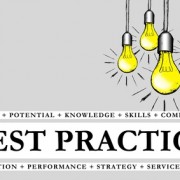How effective is your hiring process ?
A job interview is like conducting any other business meeting. It can be: shake hands, some small talk, ask questions, etc. Or it can be much more: more effective, focused, efficient.
While good meetings can make crucial contributions to your company’s success, bad ones waste your time and hence money. Same occurs with job interviews. Your time is at stake, as well as that of the other participants. But there is much more. It is the cost of a bad hire, the wasted salary, the training, the possible issues with peers and customers, the separation package, finding a replacement, etc. Quite some budget, indeed! And such a frustration for so many people!
Most likely your organization already applies best practices to ensure effective meetings. But do you do the same when it comes to interviews? Do you have a structured process in place for effective hiring? One that will give you the most information and the relevant one for selecting a new employee?
Getting there is much easier than what you may think.
Effective hiring can be as simple as following these 10 points:
Prior to interviews
- Perform a job analysis by reviewing the job description and defining the critical knowledge, skills and competences that are required to do the job;
- Define the purpose of the interview, by developing a set of questions based on the job analysis, and define what to look for in the candidates’ answers;
- Agree on scoring criteria and a rating scale to evaluate candidates’ response. This can be as simple as 1 to 5 (where 1 = low; 3 = average, 5 = outstanding);
- Train interviewers to gain professionalism and apply one agreed approach;
During the interviews
- Use a committee to conduct the interview to balance opinions, and ensure fairness and impartiality;
- Ask effective questions to evoke responses that help you make the decision;
- Ask each candidate the same set of questions you have prepared before the session, to ensure fairness and impartiality;
- Take notes as memory can be short, and you may want evidence to support and defend your selection;
After each interview
- Score the responses using the rating scale to promote objectivity. Do it right after each interview when the information is fresh in your mind;
- Make your selection. If you utilized an interview committee, gather as a group to discuss views and reasons.
Don’t rely on unaided judgment.
Don’t be subject to bias. Don’t expose yourself and your organisation to future complaints or challenges. You owe it to yourself, to your organization and its stakeholders. Thanks to a structured process for effective hiring you will be faster, more focused and objective in taking the right decisions. So, set your interviews up for success!




